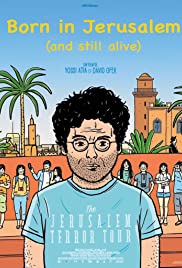
BORN IN JERUSALEM AND STILL ALIVE
Israel, 2019, 83 minutes, Colour.
Yossi Atia, Lihi Kornowski, Itama Rose.
Directed by Yossi Atia.
The title indicates theme and the attitude of the writer-director, Yossi Atia, who also takes the central role in the film. (This is obviously a very personal story for the director as it began its cinema journey as a short film for years earlier.)
We see Ronen, middle-aged, leaving his house, but going back to check whether the door is really locked. Touch of paranoia! A further reason for his paranoia is his not wanting to live with his father, though forever phoning and calling in to help him, his father wanting to be independent yet wanting his son at his side.
What Ronen does is to conduct terrorist tours in the centre of Jerusalem, Jaffa Street Jaffa Square, taking the visitors to the various sites of terrorist attacks, the blowing up of buses, shooters, suicide bombers, and stopping at the memorials. At first, he has only two Japanese visitors but one of them takes a shine to Ronen and comes on every tour, including a group of Japanese who are in Jerusalem studying the Bible. We see glimpses of many tours, a whole range of visitors, the tour is conducted in English.
Ronen meets an attractive young woman, Asia, on one tour when she asks a question and he is quietly smitten. She is an architecture student who lives in Barcelona, moves in with him at times, but is irritated by his rather passive manner. Ronen also has a friend who shares the house, Simon, never paying rent, but actually making a range of T-shirts about the tour. Ronen takes no money for conducting the tours. Simon, on the other hand…
The film is something of a glimpse at Ronen’s life, being born in Jerusalem, experiencing the terrorist attacks, still in many ways overcome by fear, surviving. (The screenplay is entirely focused on the Israeli experience, no attention given to any background for the Palestinians.)
1. Yossi Atia as writer, director, playing the central character? His previous short film? Personal identification with this story?
2. The title, the background of terrorist attacks in central Jerusalem, Jaffa Street and Square, Yossi Atia playing the central character, identifying with him? Born in Jerusalem, proud of it, the background of terror and deaths, his fears?
3. Ronen, his character, age, living with his friend, Simon, the contact with his father, not wanting to live with him, his father’s constant contacts, wanting Ronen to live with him, getting to fix things, yet refusing to wear the security band, not wanting anybody to come to help? Yet the danger of his falling? Ronen, at the gate, back to check the door locked? Indication of fear, the touch of paranoia?
4. Ronen, the idea of conducting the tours, the tours about terrorism in his street? Not charging anyone? The beginnings, the two Japanese, Shochai and his interest, continually returning, recruiting Japanese tourists, always accompanying Ronen? The particular visits, the spots, the buses, the detail, explorations, terrorists, shootings, suicide bombers, and the mounting number of deaths? The memorials, the idiosyncratic locked memorial? Ronen acknowledging some, passing others? Giving the candles to the tourists to place at a significant site for them? The continued success of the tours, the range of tourists, all in English?
5. The encounter with Asia, her asking questions, coming from Barcelona, architecture student, meeting with Ronen, the attraction, the dates, the discussions, her moving in, the effect on Ronen? Simon and his encouragement, his father’s comments? The breakfast and his moodiness, her anger, going back to Barcelona? The return, graduated, meeting Ronen again, the bond between them?
6. Shochai, the Japanese, studying the Bible in Jerusalem? His devotion to the tours? With Simon at the end?
7. Simon, not paying the rent, the T-shirts for the tour, Ronen not wanting any money, moving out for the final tour, Simon taking the tourists and asking for $25 per tourist?
8. The impact of the film for Israelis, their memories, attitudes towards the Palestinians and violence, terrorism? Those who live in Jerusalem? For younger audiences who don’t share the memories? For non-Israeli audiences and the memories of the terrorist attacks? (No perspective of the Palestinians and their motivations?)